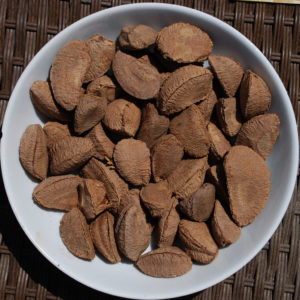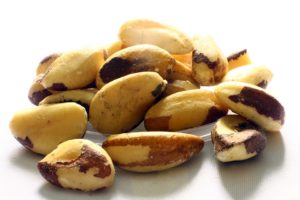The Brazil nut (Bertholletia excelsa) is a South American tree that can be harvested for edible seed. This South American tree is in the family Lecythidaceae.
Contents
Uses
- Brazil nuts can be eaten all alone. Additionally, they can also be enjoyed roasted, salted, or sweetened.
- They are also used in fudge, puddings, pesto, chocolate-bars and crunchy-bar preparations.
- They are also used in desserts, particularly in fruitcakes.
- They can also be added to soup as well as meat and vegetable dishes.
- Brazil nut oil is used in salad dressing and in cooking.
Benefits
- Good Fats. One hundred grams of Brazil nuts are approximately 656 calories. The reason why they contain so many calories is because of their high concentration of fats. A Brazil nut consists of 70 percent fat and 17 percent protein. However, most of these fats are “good fats”, these types of fats help to lower “bad cholesterol” and increase “good cholesterol” in your body. Research studies show that diets rich in palmitoleic acid and oleic acid help to prevent coronary artery disease and strokes.
- Vitamin E. Brazil nuts contain high amounts of vitamin-E. On average, 100 grams of these nuts contains 52 percent of the recommended daily value of Vitamin E. Vitamin E is a powerful antioxidant that is required for maintaining the integrity of cell membranes, mucus membranes and your skin.
- Selenium. Brazil nuts contain the highest levels of selenium found naturally in any plant, fruit or nut. Only one ounce of Brazil nuts contains over seven times the daily recommended value of selenium. An individual can obtain all of the selenium they need for the day by consuming just one or two nuts. Adequate selenium intake has numerous health benefits, including preventing coronary artery disease, liver cirrhosis, and many forms of cancer.
- Gluten-Free. Brazil nuts are gluten-free and provide a healthy alternative for people with wheat allergies and celiac disease.
- B Vitamins. Additionally, these creamy nuts are an excellent source of B vitamins, and 100 grams of Brazil nuts contain over half of the daily recommended value of thiamin. They also contain a host of energy-giving B vitamins such as riboflavin, niacin, pantothenic acid, pyridoxine and folate.
- Other Minerals. Brazil nuts have high levels of many other beneficial constituents other than selenium, including magnesium, copper, calcium, manganese, phosphorus, potassium, iron, and zinc.
- Amino Acids. Brazil nut oil contains many helpful amino acids, namely linoleic, oleic, palmitic, and alpha linolenic acids. The proteins found in Brazil nuts are an excellent source of other such amino acids as cysteine and methionine. These nuts also contain high concentrations of glutamine, glutamic acid, and arginine. These amino acids work to facilitate selenium absorption and assist the digestive absorption of other minerals in the nut.
Cautions
- Selenium Toxicity: Six Brazil nuts contain 544 micrograms of the mineral selenium. The recommended dietary allowance of selenium for healthy adults is only 55 micrograms per day. If you consume more than 400 micrograms daily, you may develop selenium toxicity, a condition known as selenosis. Symptoms of selenosis include hair loss, nervous system damage, skin sores and rashes, discolored teeth, diarrhea, nausea and nail brittleness or loss. In extreme cases, it may cause kidney damage, heart failure or death.
- Possible Increase In Heart Disease Risk: A study published in 2010 in the Journal of Nutrition reported that, out of over 1,000 research participants, those who had the highest concentration of selenium in their blood were more likely to also have elevated blood cholesterol levels. It’s not yet known if excess selenium directly affects cholesterol or if it is part of another biological process that alters cholesterol levels, but the researchers concluded that consuming more selenium than the RDA may increase your risk of heart disease.
- High Barium Content: Barium is a metal that can accumulate in seafood, grains, dairy products and drinking water, as well as Brazil nuts. The barium concentration in the nuts varies with geographical location, but it may be as high as 3 milligrams of barium in every gram of Brazil nuts. The upper intake level of barium is set at 200 milligrams per day. Eating 3 ounces of the nuts, an amount equivalent to about 18 to 24 nuts, would supply you with more barium than is considered safe, in addition to toxic levels of selenium. Over time, excess barium intake may contribute to high blood pressure.
- Allergic Reactions: As a tree nut, Brazil nuts are a common cause of allergic reactions. Symptoms can range from mild – nasal congestion and nausea, for example – to severe vomiting and diarrhoea, facial swelling, trouble breathing and anaphylaxis, a condition that may result in death. In addition, a 2007 report published in the Journal of Investigational Allergology & Clinical Immunology identified Brazil nuts as the cause of the first recorded case of a sexually transmitted allergic reaction. If you are allergic to any tree nut, avoid consuming Brazil nuts, Brazil nut oil or any product that may be contaminated with either.
Interactions
- Cross-reactions may occur to some other nuts and fruits, especially of Anacardiaceae family such as mango, cashew nuts, pistachio. Persons with known allergic reactions to any of these nuts may, therefore, need to observe caution.
Other Names
Bertholletia excelsa. Some of the common names in local dialects are castanha-do-pará, castania, para-nut, cream-nut, Castaña-de-Brazil (chestnuts of Brazil).
References
Source: Herbwisdom.com, http://www.herbwisdom.com/herb-brazil-nuts.html
Nutrition-and-you, http://www.nutrition-and-you.com/brazil-nuts.html
eHow, http://www.ehow.com/about_5382624_dangers-brazil-nuts.html


